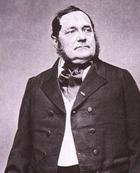
Adalbert Stifter was born in the small mercantile town of Oberplan (now Horní Planá, in the Czech Republic) in 1805. He was the eldest son of Johan Stifter, who died in 1817 crushed by a train. Although the family did not have much money, Stifter was educated at the Benedictine Gymnasium of Kremsmünster, and in 1826 he enrolled at the University of Vienna to study law. In 1828 he fell in love with Franny (Franziska) Greipl but, after five years of relationships, his parents forbade him to continue seeing her. It was a loss that Stifter could never recover from. In 1835 he became engaged to Amalia Homaupt, with whom he married in 1837. It was an unhappy marriage. Stifter and his wife, unable to conceive children, adopted, over the years, three of Amalia's nieces. One of them would escape and another, Juliana, disappeared and was found floating on the Danube four weeks later. While living in Vienna, Stifter earned his living precariously as guardian of the offspring of the Viennese aristocracy. Assiduous to the intellectual life of the Austrian capital, it was usual to find him in the famous Burgtheater and literary cafes accompanied by figures such as Franz Grillparzer, Joseph von Eichendorff or Robert and Clara Schumann. After visiting the city of Linz in 1848, he decided to settle there a year later. His physical and mental health began to worsen in 1863, and in 1867 he became ill with cirrhosis. Plunged into a deep depression, he cut his neck on the night of January 25, 1868, and died two days later. Considered one of the most important authors in the German language of the nineteenth century, he owes works of the importance of Abdias (1842, edited in Spanish by Nordic Books, 2008), The bachelor (Spanish version of Der Hagestolz, 1944, published by Impedimenta, 2009), Brigitta (1844, in Spanish, Bartleby, 2008), The Colored Stones (1853), Witiko (1867) and especially The Late Summer (1857), in Spanish, Pre-Textos, 2008). The path in the forest (Der Waldsteig), a small and delightful work completed in 1845, combines all the virtues that make Stifter a true genius: the descriptions of wild landscapes and the spirit of German Romanticism, all bathed in an easy-going a candor that we rarely see reflected in a literary work with such delicacy.





